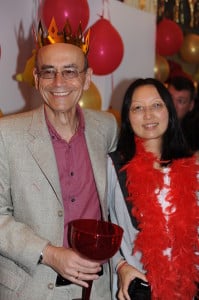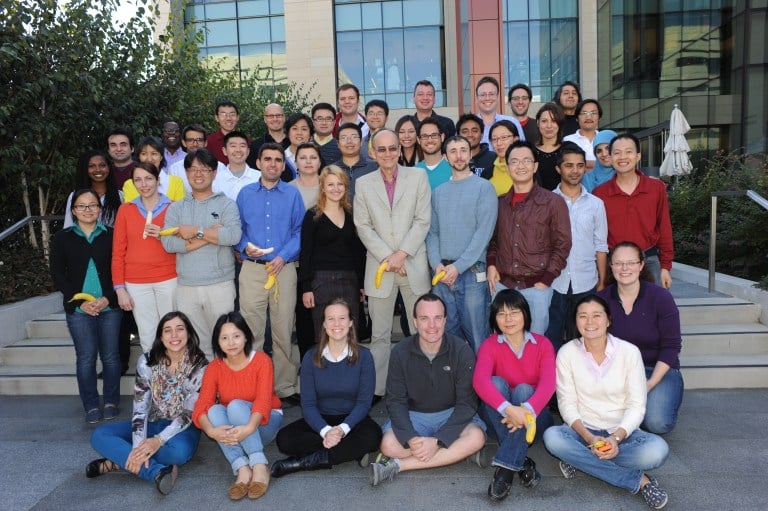Thomas Südhof was driving through the middle of Spain when he received the phone call notifying him that he had been awarded one of the most prestigious honors in his field, the Nobel Prize in Physiology or Medicine.
“I didn’t expect it,” said Südhof, a professor of molecular and cellular physiology at the Stanford School of Medicine. “There are so many people who deserve a Nobel Prize. There’s no reason to suspect that you’re going to get it.”
As unexpected as it was, Südhof’s wife Lu Chen already knew about the award —earlier that morning, she had been the first to hear the news from the committee.

“I was dying to tell him myself, but cell phones display numbers. If he sees it’s my number, the surprise is already halfway gone,” said Chen, an associate professor of neurosurgery and of psychiatry and behavioral sciences, also at the School of Medicine. “It’s a historical moment in his life, and no matter how much I’m tempted to [call him myself], I don’t have the right to deprive him of that moment.”
Südhof received the award for his research on how synapses affect communication between neurons within the brain.
“This [Nobel Prize] is about the work that we performed over two and a half decades to discover how a synapse speaks — how, in a synapse, neurotransmitters are released in response to a presynaptic action potential,” Südhof explained.
Yet Südhof did not always know he wanted to go into science. He grew up the son of two physicians in Göttingen, Germany, and his father was also a professor of medicine.
“I had no particular interest in science when I was a child or high school student,” Südhof said. “I started to study medicine after high school because I thought that would give me a lot of different possibilities…and because I liked the idea of potentially doing something useful.”
As a medical student, Südhof became interested in science and began working in a lab. In 1983, he moved to the United States for post-doctoral training and joined the laboratory of Michael Brown and Joseph Goldstein at the University of Texas Southwestern Medical Center. Brown and Goldstein were awarded the Nobel Prize in Physiology or Medicine in 1985, and a year later, Südhof started his own lab at UT Southwestern.
In 1993, Südhof met Robert Malenka, a professor in psychiatry and behavioral sciences at Stanford — and one of the main reasons why Südhof would eventually come to Palo Alto.
“I can tell you the exact date I first approached him: June 1993, about 20 years ago,” Malenka said. “He had some genetically modified mice that were lacking some proteins I was interested in.”
Malenka was the chair of the search committee for Stanford’s Avram Goldstein endowed professorship and recruited Südhof for the position in 2008.
“Tom was my number one draft choice because I knew what a great scientist he was and I knew what a good collaborator he was,” Malenka said.
Südhof said that after being at Southwestern for 25 years and serving as chair for the last 10 years of his tenure, he was ready for a new challenge.
During his time at Stanford, Südhof has received the 2010 Kavli Prize in neuroscience and the 2013 Albert Lasker Basic Medical Research Award. Those who have worked with Südhof attest to his dedication and love of his research.
“He is a force of nature,” Malenka said. “He is driven in an incredibly passionate and intense way to understand how synapses work. He will use every approach and every method humanly possible to attack the questions he’s interested in.”
Although Südhof’s work has uncovered specific proteins involved in synaptic transmission, he encourages his lab to keep the big, overarching questions in mind. Garret Anderson, a postdoctoral research fellow who works with both Malenka and Südhof, spoke about Südhof’s attention to detail while still focusing on the larger picture.
“Tom is a very detailed man,” Anderson said. “He’s never satisfied with easy, quick, dirty experiments; he’s more interested in very broad questions and figuring out the true mechanisms of what’s going on.”
Lulu Chen, another of Südhof’s postdoctoral research fellows, described her first time meeting Südhof. After her interview with him, she knew on the spot that she wanted to work in his lab.
“I told him I want to play science. I want to enjoy research. The only reason that I’m doing postdoc [work] is because I love it,” Lulu Chen said. “Tom’s answer was, ‘Lulu, if I’m not having fun, I don’t know why I wake up in the morning.’…That was the reason I made the decision.”
Remnants of Südhof’s surprise congratulatory party with all three labs — Südhof’s, Malenka’s and Lu Chen’s — still decorated the area outside the labs 11 days after the Nobel Prize announcement. Lulu Chen explained that Südhof’s generosity and fairness help create the positive atmosphere in the lab.
“You would think that somebody like him would be so busy, but you can see we don’t have that problem here,” Lulu Chen said. “Anytime we want to talk to him, he’s always there.”
The labs’ annual group activities include a summer beach day, Secret Santa and dumplings at Südhof’s house. According to Lulu Chen, Südhof also holds a weekly journal club for all three labs.
“He reads a paper; in probably five minutes he gets everything, and he has all the historical background,” Lulu Chen said. “But he’ll sit there, spend one whole hour with 50 of us and then go through it.”
Given Südhof’s patience and kindness, Lulu Chen said that she has never heard him yell at anybody and explained that he encourages lab members to explore any ideas that interest them. Anderson also spoke about Südhof’s openness to failure.
“What I think I’ve gained the most from Tom is the freedom to develop big stories,” Anderson said. “I enjoy that freedom to think big and not be afraid of projects failing.”
And in addition to the time he spends at the lab, Südhof also balances family time with Lu Chen and their two young children, ages three and four.
“As it turned out, I have small kids now, which at my age is unusual,” Südhof said. “Right now, my passion outside of my research is to spend as much time with them as possible.”
According to Lu Chen, her husband has advice for the next generation of scientists.
“He said, ‘Read classical literature; don’t only read the trendy publications,’” Lu Chen said. “I think that’s very important advice. If you want to find an important topic in science, don’t always follow the trend.”
Even with his many accomplishments, Südhof has not made plans to retire any time soon.
“I find this really very exhilarating: to be a professor and to do science,” Südhof said. “The problems and the questions that we are facing as scientists are so interesting and so challenging that I wouldn’t think of not going after them.”
Contact Kylie Jue at kyliej ‘at’ stanford.edu.
